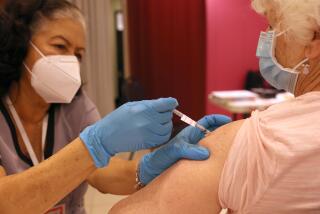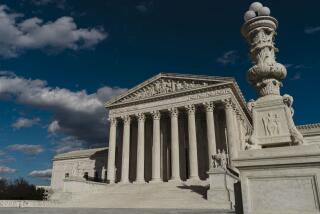Court Allows Sexual History in HIV Case
- Share via
People who don’t tell their partners about their sexual pasts could be forced to pay damages for negligently transmitting AIDS or other sexually communicable diseases, the California Supreme Court has ruled in a groundbreaking decision.
In a 4-3 ruling Monday, the state’s highest court held that a man accused of infecting his wife with HIV, the virus that causes AIDS, must disclose in pretrial proceedings some of his previous sexual activity.
Although the court had never ruled on the issue, Justice Marvin Baxter, writing for the majority, said state appeals courts across the country “have long imposed liability on individuals who have harmed others by transmitting communicable diseases.
“We agree with these courts that to be stricken with disease through another’s negligence is ... no different from being struck with an automobile through another’s negligence,” Baxter wrote.
The case pitted the rights of a woman infected -- apparently unintentionally -- with a deadly disease against her husband’s right to privacy. Under the ruling, people can be held liable even if they do not know they are infectious.
The decision is a sign that courts are willing to permit greater scrutiny of a person’s sexual behavior, said Katharine A. Baker, a professor at Chicago-Kent College of Law and co-author of a law review article on reckless sex. “When the world changes, the law has to change with it. It may be that dangers caused by AIDS are sufficiently grave that we have to rethink duties of care with regard to sexual activity.”
Still, she said, it remains to be seen how broad the ruling’s impact will be. AIDS and other sexually transmitted diseases have not generated a lot of litigation, because potential plaintiffs know that filing suits will open up their personal lives, Baker said.
In this instance, however, a woman identified in the decision only as Bridget B was sufficiently angry to go to court.
“This is a sad case,” Baxter wrote, noting that both the plaintiff and the defendant, John B, are infected with HIV and that each has blamed the other.
The case raised a host of legal issues, according to Baxter. Regarding its first stage -- pretrial discovery -- the prime question was how much Bridget B was entitled to learn about her husband’s medical records and sexual history.
John asserted that he could be held liable only if he had knowingly failed to tell his wife that he had HIV. The majority -- Baxter, Chief Justice Ronald George and Justices Ming Chin and Carol Corrigan -- disagreed.
They concluded that a plaintiff, such as Bridget, must be permitted to see some of those records if there was evidence that the defendant should have known he was infected.
Sometime after they began dating in late 1998, John told Bridget that he was monogamous and disease-free, Baxter wrote. John insisted, according to the decision, that they stop using condoms.
They became engaged a year later and married in July 2000. That September, Bridget began to suffer from exhaustion and high fevers. A month later she learned that she had tested positive for HIV. Then, John was diagnosed as HIV-positive. Subsequently, he admitted to her that he had had sex with men before the marriage.
Bridget sued. She alleged that John had engaged in fraud, acted negligently and inflicted emotional distress on her.
A Los Angeles trial judge ruled that Bridget was entitled to extensive discovery about John’s sexual history, including the name, address and telephone number of every man he had had sexual relations with over the last 10 years.
A state appeals court said that was too broad but that Bridget was entitled to the date of John’s first sexual encounter with a man, the number of such encounters he had had in the five years before meeting her and the number since meeting her.
The high court, in Monday’s ruling, narrowed the scope of discovery considerably, saying Bridget was entitled only to information about John’s sexual activities for the six months before an August 2000 physical examination in which he tested negative for HIV. The court cited a finding of the Centers for Disease Control and Prevention that once a person has been infected with HIV, he or she will test positive within six months.
Eric Multhaup, John B’s lawyer, said in a telephone interview that he was pleased the court had narrowed the scope of discovery, “imposing limits that protect John’s constitutional rights of privacy.”
Despite that limitation, the majority stated emphatically that there were clear policy reasons for permitting Bridget to gain access to some of John’s sexual history.
Limiting liability to defendants “who have actual knowledge they are infected with HIV would have perverse effects on the spread of the virus,” Baxter wrote.
“If only those who have been tested are subject to suit, there may be an incentive for some persons to avoid diagnosis and treatment in order to avoid knowledge of their own infection,” Baxter added.
On the other hand, he wrote, extending liability to those with “constructive knowledge of the disease ... will provide at least a small incentive to others to use proper diagnostic techniques and to alter behavior and procedures so as to limit the likelihood of HIV transmission.”
“In this case, we conclude that” liability for “negligent transmission of HIV does not depend solely on actual knowledge of HIV infection,” Baxter wrote. A person can be held liable if he “has reason to know,” the court held.
Reason to know exists when there is sufficient information to cause a “reasonably intelligent” person “to infer he or she is infected with the virus or that infection is so highly probable that his or her conduct would be predicated on that assumption,” Baxter added.
In his effort to prevent the pretrial discovery Bridget was seeking, John asserted that “the risk of transmission of HIV in any individual act of intercourse is so low as to make it unreasonable to impose a duty of care on someone who is not actually aware he or she is infected.” The majority disagreed.
“A low risk of transmission is insufficient to relieve the infected individual of a duty where the harm itself is great and the duty of care to prevent that harm is not onerous,” Baxter wrote.
“The AIDS epidemic was and continues to be one of the most dangerous of the modern era, killing over half a million Americans as of the end of 2003. Despite the introduction of antiretroviral therapy, AIDS remains the fifth-leading cause of death among those ages 25 to 44. Sadly, HIV mortality declines have slowed while at the same time, AIDS diagnoses have risen,” Baxter added.
Justice Carlos Moreno issued a blistering dissent, saying Bridget was entitled only to discovery “directed at whether and when” John had actual knowledge that he was HIV-positive.
The court majority “allows a person who tests HIV-positive to bring an action against all former sexual partners and attempt to ascertain not only whether they had actual knowledge they were HIV-positive when they engaged in sexual relations, but also whether they had any ‘reason to know’ they were HIV-positive,” Moreno wrote.
“This cause of action potentially licenses invasions into the sexual privacy of all sexually active Californians and may even invite abuse of the judicial process,” he said.
And he warned, “One can easily foresee a spate of ‘shakedown’ or vengeance lawsuits brought by plaintiffs whose motivation is not so much to discover how they contracted HIV as to force lucrative settlements or embarrass a former sexual partner by exposing that person’s sexual history in the guise of obtaining relevant discovery.”
Multhaup, John’s lawyer, said the case will now go back to a Los Angeles trial court for pretrial discovery. Bridget B’s lawyer was not available for comment.
More to Read
Sign up for Essential California
The most important California stories and recommendations in your inbox every morning.
You may occasionally receive promotional content from the Los Angeles Times.










